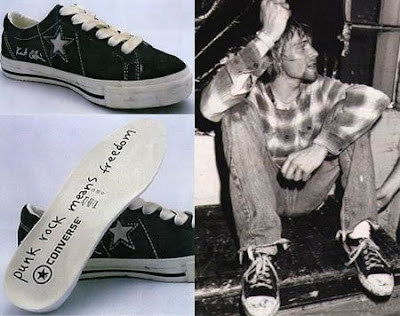
Just like you can't go to a Melissa Etheridge concert without seeing an abundance of pit hair, these days you can't go to an indie rock concert without seeing... emaciated men? This season, anorexic is the new black for the skinny jeans and eyeliner-for-men set. In a profession where rock stars have typically looked drug-emaciated a la Steven Tyler and David Bowie, this new trend hasn't garnered a lot of attention. The difference now however is that rather than all the bony rib cages being a result of popping oxycontin like tic tacs, thinness is sought after as a goal in its own right. Blame American Apparel or Pete Wentz, but men in this particular hipster subculture are now being held up to the impossibly skinny standard - and realizing firsthand how difficult it is to reach and how painful it is to always come up short.
Recently Caleb Followill of Kings of Leon admitted that he struggles with anorexia. In an interview with Q magazine he says, "I always thought I wasn't good enough. I'd do anything to keep my hands and mouth busy without eating." Adds Priya Elan of The Guardian, "He lived on black coffee and would go running in hot weather wearing a heavy tracksuit to sweat off as many pounds as possible in order to stay skinny. It isn't a huge surprise that the singer of one of indie rock's biggest bands was anorexic. What is surprising is that he's admitted it."
Followill might be the most honest of the group but he certainly isn't the only indie boy in this band. Other indie stars known for their bony frames and body issues include Kurt Cobain, Pete Wentz, Kaiser Chief's Ricky Wilson and Amos Lee. Seeing as I love all of their music (yeah, I just admitted to digging Fall Out Boy. I'm 12, I know.), it would be a shame to see any of them go the Karen Carpenter route - barring Cobain as he's already playing his coffeehouse gig in the sky.
 Amos Lee looks over his shoulder in an alley. Which I would be too if I were sitting on such a nice leather "free" chair.
Amos Lee looks over his shoulder in an alley. Which I would be too if I were sitting on such a nice leather "free" chair.Slowly but surely it's been percolating to the surface of our media-addled public consciousness that men struggle with body issues too, whether it be looking good in bike shorts at the gym or measuring up to David Beckham's, ahem, standard (is that what the kids are calling it these days?). Worse, it is filtering down to all levels of society as evidenced by my literal tug of war with a pair of teenaged boys over a thrift-store pair of women's Chip and Pepper skinny cut jeans. (I won. You do NOT mess with me in a thrift store!)
Reader Andrew (AJH) pointed this out in his comment on my Finding Your Best Weight post:
Don't think these thoughts are just in women's heads, I was just the same when I was "losing" and am still to a degree. I started at 110kg with a goal weight of 90kg. Each time I reached a goal weight, another 5 kgs seemed like a good idea. I got down to about 68kg and my wife started saying I was looking sick, I couldn't see it, but did find I was finding I had less energy when exercising. I went back up to 70kg, and even then it didn't feel right, I decided less than 75kg seemed a good target and have been there for more than 5 years, feeling good. However, I have been around 72kg the last few months, and there is definitely a thought of that "safe buffer" you mentioned. I think if you're eating sensibly, feeling good and can do the things you want with the energy level you want, you're probably at the right weight.
It's also been shown that young gay men are particularly susceptible to body image woes and eating disorders. As a mother to three wonderful sons and one adorable daughter, I often worry about how society in general and my own struggles in particular will affect my daughter's sense of self and vulnerability to eating disorders. But now I am also worried about the messages my boys are getting. Even as young as they are (my eldest is 8), they are still bombarded daily with messages about what it means to be attractive and how to achieve that standard.
Body image issues in men may not be as prevalent or as pernicious as among women but give 'em twenty years to catch up; we had a head start. What do you think? Have you seen this in any of the men or boys in your life? How do I talk to my sons about this issue? Are eating disorders viewed differently in men than in women? Anyone else a thrift-store addict like I am?? (Today was 50% off day! I so totally scored!!)


.jpg)


.jpeg)




